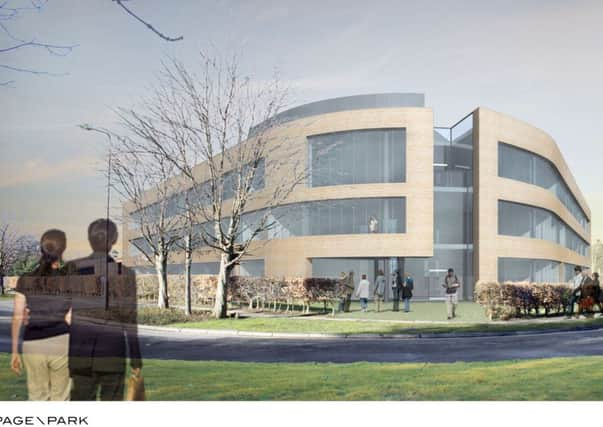Work starts on £17m climate change research centre


A joint venture between Heriot-Watt University and the British Geological Survey, The Lyell Centre for Earth and Marine Science and Technology will feature an unprecedented mix of industry-leading professionals.
Geologists, marine scientists and climate change and petroleum experts will all work closely together in the new hub to produce cutting-edge interdisciplinary projects – ranging from ways to mitigate rising ocean temperatures to coming up with more efficient and eco-friendly ways to extract oil from the ocean floor.
Advertisement
Hide AdAdvertisement
Hide AdContractor Morrison Construction is set to begin work on the state-of-the-art Lyell Centre this month on Heriot-Watt’s Edinburgh campus, with completion due January 2016.
Centre co-ordinator Professor Murray Roberts says the next 12 months will be spent conducting a major talent search to bring the world’s leading minds to Edinburgh.
“Over the next year Heriot-Watt is embarking on an ambitious £8.5m recruitment drive to appoint new research stars to move into the Lyell Centre and drive it forward,” he said.
“The Lyell Centre is working at the interfaces of applied geoscience, ecology and technology – and although it might seem a bit counter-intuitive to have climate change scientists and petroleum scientists eating together in the same canteen, we need this interdisciplinary approach to tackle the grand challenges of energy supply and sustainable development in a changing world.”
Co-operative efforts that have already been suggested include the development of intelligent porous rock, which would enable scientists to better understand how minerals and oil can be extracted from underwater rocks. To achieve such innovation, the project would require experts in environmental modelling, carbon storage and high-power lasers.
“Right now, we know less about our own ocean floor than we know about the dark side of the moon,” the professor said.
“We can learn so much more by working together, and that’s why the Lyell Centre is going to be really exciting. This is Heriot-Watt’s opportunity to make a real impact in the fight against climate change.”
The new centre will also house the Scottish headquarters for the British Geological Survey (BGS), the UK’s leading geoscientific body.
Advertisement
Hide AdAdvertisement
Hide AdJohn Ludden, Executive Director BGS, said the group’s new home in the Lyell centre would allow the BGS to build new bonds with fellow researchers.
The centre was named after Sir Charles Lyell, a Scottish scientist widely revered as the leading geologist of the nineteenth century.
Lyell was notably one of the first to believe that the world was more than 300 million years old, and was a close and influential friend of Charles Darwin.
Eddie Robertson, Regional Director of contractor Morrison Construction said: “We look forward to working with Heriot-Watt University and The British Geological Survey to create the top-class facilities the students and staff deserve.”